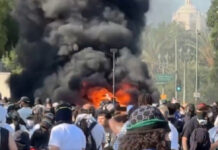I have little faith in humanity.
When you have to write about prepping multiple times per week, you have to think about prepping, and that brings some clarity. For example, when I contemplate end-of-the-world scenarios, I don’t see many people pulling together to help each other out. Instead, I predict most will be selfish and look out for themselves, even to the extent of killing others to advance their own cause. The idea of teaming up and working with others seems to be a lost art.
I can’t say I am alone in this prediction. Cormac McCarthy’s The Road had its share of people out for themselves. 25 years prior, when Mad Max the Road Warrior came out, it featured people working in groups. In 1981’s Road Warrior, it was us against them, good against evil. In 2006’s The Road it was you against me. Now it is everyone for themselves, which means everyone against everyone else. My, how the world has changed.
While I wish the country was filled with honorable people willing to do the right thing under any circumstances, I think that idea died off a couple of generations ago. It was still the case when I was growing up, but somewhere along the way, the concept of doing the right thing as measured by societal consensus or Christian-Judeo values was replaced by people doing what is best for them, even If it is at the expense of others. Most people don’t care about their fellow man or their country; all they care about is themselves. It’s all me, me, me.
Selfish Whiners
We see this behavior today in the anger of the woke mob. They want the 99 percent of us to change because we are hurting the feelings of a vocal but tiny minority that no one had ever heard of 40 years ago.
For example, I’m waiting to be canceled for calling Tom Brady or some other athlete the GOAT because it offends a tiny village of trans people in Vermont who style their hair to look like horns and enjoy having sex with goats. That may sound stupid, but this is a world with cross-dressing nuns in garish makeup are trotted out as entertainment at baseball games.
The selfish and demanding whiners who are unwilling to put in the hard work are often from the younger generations. They are blind to anything outside their immediate gratification, which they believe the world owes them. I can only imagine how they will act at the end of the world when they see you have food and they don’t. “I’m hungry and tired. Feed me. Give me your supplies. It’s unfair that you are prepared and I’m not, so you have to share. Wah, wah, wah.”
What’s the answer? I’m tempted to say a shot to their craniums. That may be the ultimate solution, but there are some intermediate steps you can take.
Saying “No”
Even if hordes of goat-loving socialists never show up at your door after a SHTF scenario, someone will.
Maybe it will be that guy from work who knows where you live and that you like guns. It could be a relative who thinks you must support them because of blood ties, even though they have no work ethic and their spouse weighs 400 pounds. It might even be your UPS man, who has taken note of all the long-term storage food he delivered there. (Of these three, he’s the only one I would let in. Those guys work hard and he’s smart enough to put two and two together.)
As a prepper, you cannot afford dead weight. Everyone must work. Everyone must follow the policies and procedures as established by the retreat leader or leadership team. If they have no useful skills and refuse to use a shovel in the garden or an axe in a grove of firewood because it is too much like work, you don’t want to waste your food on them.
So, how do you say “no” to your spoiled niece and her lazy boyfriend, the random stranger who stumbles up to your door with a hungry child, or anyone else shows up begging for charity? Here are a few ways.
Stop them Early
The best place to stop people is well before they get to your house. I’ve said this about attackers, but it goes for beggars, too. Just as you want to stop people from shooting your house and outbuildings by preventing them from getting that close, you want to intercept distant relatives and so-called “friends” who think you will support them for the duration of the crisis well before they see your chickens, the rows of corn, or other signs that you have food and can support them.
One way to do that is with a barricaded road or entrance to your community. A manned barricade is better yet. In a scenario where a barricade is manned by a rotating staff of defenders, someone else can turn away people youknow. “Sorry, we aren’t accepting any visitors.”
“But my uncle Pete said stop by any time.”
Guard checks clip board. “Your name isn’t on the visitor’s list. But there’s a church two miles down the road that is accepting refugees. I hear they serve soup every night.” No need to tell them it is stone soup.
If people seem intent on entering your area of operations, you will need roving patrols. They should be less friendly and more threatening, even to the point of engaging people sneaking in through the woods.
Of course, this takes people, and that demands a prepper group or community of like-minded people.
A Qualified Yes
Another alternative is to set up a tent in the middle of a field. Tell any arrivals that you are worried about diseases and they have to be quarantined for 30 days before they can join your group. The tent should be unfurnished with no bedding. Once a day, someone will drop off a bucket of food, but it won’t be much. Tell them there’s a spade and they have to dig their own latrine. Explain that it should be far from the stream, since that is their water source. Chances are, they won’t stick around long.
A similar technique is for the people manning the barricade to interview people and ask if they have any needed skills. Are they a doctor or a nurse? If so, did they bring antibiotics and instruments? Were they in the military? If so, did they bring their kit, a gun, and a minimum of 1,000 rounds of ammo? Did they bring three months of food? How can they add value? If they don’t meet the requirements, tell them they do not qualify and apologetically turn them away.
This way, if someone shows up three weeks after an EMP in a wagon drawn by a team of horses, loaded with blacksmithing tools and a portable forge, with a dairy cow and a calf tied behind the wagon, your qualified “yes” can become a permanent yes after a more detailed interview and a vote.
Warning Signs and Warning Shots
Manning a barricade takes manpower, and there will be times when that manpower could be better spent on other tasks, like raising food. If traffic is low, consider warning signs, which may cause people to think better of proceeding. Warning signs with dead bodies hanging from them or on shot-up cars might be even more successful in encouraging people to pass you by.
Barricades with warning signs will not only slow people down, if they break through them, it proves that they are the post-SHTF version of trespassers. If they are smart and polite, they will see the sign, realize they are unwelcome, and go elsewhere. If they are dumb or desperate, they might not. I like the idea of multiple barricades to slow attackers and intercept them. If they break through, climb over, or otherwise circumvent the first barricade, then you should be prepared to attack them at the second.
While it may take multiple people to man a barricade, one person with a gun can reinforce a warning sign by firing a warning shot from a sniper hide as people approach. The warning shot serves two purposes: First, it warns those approaching that the warning message on the signs is true and are backed up with firepower. Second, the shot serves as a call for people to man the next barricade, which should be further up the road, or to be ready to repel invaders. Finally, if the group acts aggressively, warning shots can quickly turn into shots on target, pinning down the enemy and even reducing their numbers.
I should emphasize that it is not our job as preppers to kill people looking for a handout or a retreat days or weeks after an event. Instead, it is our job to dissuade them from approaching our retreat. Killing should be a last resort unless you know the approaching group is hostile. If they are trying to kill you and take over your retreat, then use everything in your power to kill them first.
Charity
There has been a great deal written in prepper blogs and prepper lit about how and when to give charity to those in need. This varies from making donations to a local church and directing people there to giving people food enough for one meal if they move on. The latter may make you feel better about yourself, but it only works if you are in a low-traffic area. Also, the last thing you want is to develop a reputation as a place for an easy meal.
In the immediate diaspora of city folk out of the cities in the proverbial “golden horde,” I doubt any prepper will be able to afford to give much charity, especially if they are on a well-traveled road. People who failed to plan have planned to fail, and you cannot save them all. Attempting to do so will only cut your supplies and endanger your family.
It is a different story if, two years in, a neighbor is struggling to feed his family because of a poor harvest or due to an injury or illness. That is a scenario in which I can be charitable.
You have to draw your own lines and make your own policies. When do you shoot? Do you shoot to drive someone off or shoot to kill so they will never become a threat? (People asking for charity could be scouts for a larger group of aggressors.) Where does that line lie for you and yours, and who has the authority to make that decision?
Lots to think about, and better to do it now than at the last minute.







